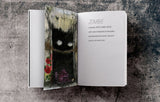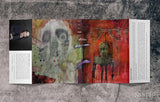Written in the form of journal entries—collections of thoughts broken up by screaming capital letters and crude marker drawings—Zombie by Joyce Carol Oates is a brilliant, unflinching journey into the psychotic consciousness of a serial killer.
Zombie views the world through the eyes of Quentin P., newly paroled sex offender, as he chillingly evolves from rapist to mass murderer. With each page of his diary, Quentin details his obsession with creating a “zombie”—a lobotomized young man to serve as a sex slave—while interspersing recollections of his past nefarious deeds. Devastating in its impact, Zombie provides a psychologically astute portrait of the cold calculation and dark obsession that can make a serial killer horrifyingly successful and maddeningly elusive.
Upon its publication in 1995, Zombie was proclaimed the author’s “boldest, most disturbing masterwork… demonstrating why Oates ranks among America’s most respected and accomplished literary artists.” Bestselling author and psychiatrist Peter D. Kramer wrote of the novel, “At the heart of Zombie are chastening paradoxes: Depicting the worst in human nature, Oates embodies our saving virtues, empathy, imagination and wonder. Zombie succeeds at a profound level, simultaneously horrifying the reader and demonstrating that nothing human is alien to us.”










